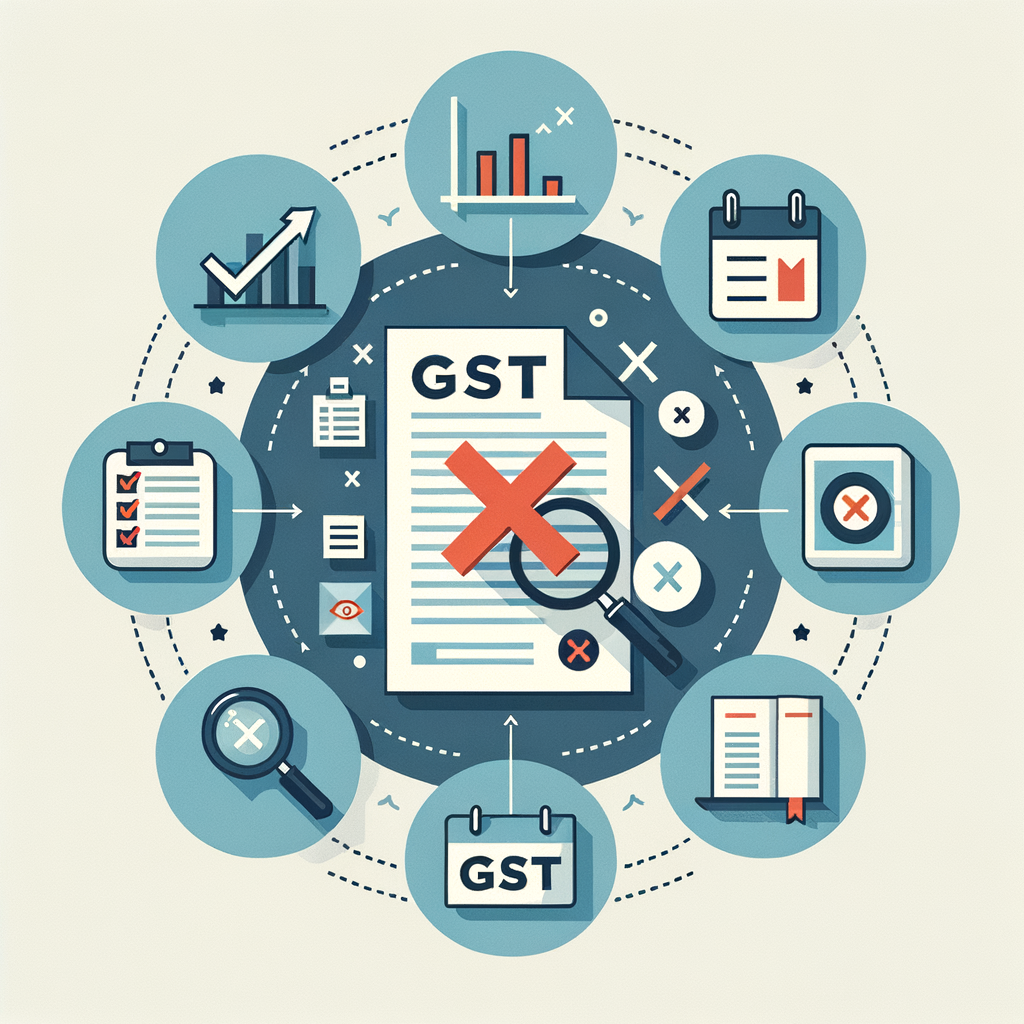ITC Denial Cases in GST: Recent Trends and Compliance Tips for 2025
Imagine meticulously calculating your business expenses, filing your GST returns on time, and still receiving a notice from the tax department rejecting a significant portion of your tax credit. This scenario, a common fear for many Indian businesses, can lead to unexpected cash outflows and legal hassles. The core of this issue lies in the increasing number of ITC denial cases, a critical concern as tax authorities tighten their scrutiny. Input Tax Credit (ITC) is the lifeline of the GST regime, allowing you to deduct the tax you’ve already paid on inputs from the tax you owe on your final product. This prevents the cascading effect of taxes and keeps your business financially healthy. This article will break down the recent trends behind these denials, explore the key legal aspects, and provide actionable ITC denial compliance tips to help you safeguard your claims in 2025 and beyond.
The ABCs of Input Tax Credit (ITC) and Its Importance
Understanding the fundamentals of Input Tax Credit is the first step toward protecting your business from potential disputes. It’s not just a compliance task; it’s a critical component of your financial strategy. Ignoring the health of your ITC can introduce significant risks, impacting your profitability and operational stability.
What is Input Tax Credit (ITC) in Simple Terms?
Think of a local bakery. To bake bread (the output), the baker buys flour, sugar, and yeast (the inputs). They pay GST on these purchases. When they sell the finished bread, they collect GST from their customers. Input Tax Credit (ITC) is a mechanism that allows the baker to subtract the GST they paid on the flour, sugar, and yeast from the GST they collected on the bread. They only need to pay the remaining difference to the government. This simple process ensures that tax is only levied on the value added at each stage, not on the full value of the product, which would include previously taxed inputs. This credit is claimed against the different components of GST—Central GST (CGST), State GST (SGST), and Integrated GST (IGST)—and directly reduces your final tax bill, which has a massive impact on your business’s working capital and overall profitability.
Why Ignoring ITC Health is a Major Business Risk
Treating ITC management as a mere clerical task is a major business risk that can have severe financial consequences. The ITC denial implications for businesses are direct and painful. Firstly, a denied credit means your tax liability shoots up unexpectedly, forcing you to pay the disputed amount out of pocket. Secondly, this payment is often accompanied by hefty interest charges (currently 18% per annum) and penalties that can go up to 100% of the tax amount. This sudden, unplanned expenditure can severely disrupt your cash flow, making it difficult to manage day-to-day operations, pay suppliers, or meet salary obligations. Therefore, proper ITC management is not just about avoiding trouble with the tax department; it is a cornerstone of sound financial planning and a crucial element in maintaining your business’s competitive edge and long-term viability.
Unpacking the Rise in ITC Denial Cases in India
The GST ecosystem is evolving rapidly, with tax authorities leveraging technology and data to enforce compliance more effectively. This has led to a noticeable surge in scrutiny and, consequently, a higher frequency of ITC claims being challenged or rejected. Understanding the specific reasons behind these denials and the emerging trends is essential for any business looking to stay compliant.
Top 5 Reasons Your ITC Claim Might Be Rejected
While the reasons for denial can be varied, a GST ITC denial analysis reveals a few common culprits that businesses often overlook. Here are the top five reasons your ITC claim might be flagged:
- Mismatch in Invoices: This is the most common trigger. A discrepancy arises when the details of an invoice you’ve recorded in your books (and claimed in your GSTR-3B) do not match the details uploaded by your supplier in their GSTR-1, which is then reflected in your GSTR-2B. The Impact of GSTR-2A and GSTR-3B Mismatches on ITC Claims is significant, and even a minor error in invoice number, date, or taxable value can lead to an automated notice.
- Supplier Non-Compliance: This is a major red flag for tax authorities. You may have a valid invoice and have paid the supplier, but if that supplier fails to deposit the collected GST with the government, your ITC can be denied. The department’s view is that the credit chain is broken, and the burden often falls on the recipient to prove the tax was paid.
- Invalid Documentation: An invoice is not just a bill; it’s a prescribed legal document. If your tax invoice is missing mandatory details like the supplier’s and recipient’s GSTIN, HSN code for goods/SAC for services, place of supply, or a clear description of goods/services, it can be deemed invalid, and the ITC claim associated with it will be rejected.
- Non-Receipt of Goods/Services: ITC can only be claimed after you have actually received the goods or services. Tax authorities are increasingly asking for proof of receipt, especially in high-value transactions. Inability to furnish supporting documents like e-way bills, delivery challans, or lorry receipts can lead to the reversal of your credit.
- Blocked Credits Under Section 17(5): What ITC Cannot Be Claimed?: The GST Act explicitly disallows ITC on certain goods and services, known as “blocked credits.” Common examples include expenses on food and beverages, club memberships, employee life/health insurance (with some exceptions), and motor vehicles purchased for non-business transportation. Claiming ITC on these items is a straightforward violation and will be denied.
Recent Trends in ITC Denial: What to Expect in 2025
The landscape of GST compliance is being reshaped by technology and stricter enforcement. As we look towards 2025, several recent trends in ITC denial are solidifying, and businesses must adapt to this new reality.
- AI and Data Analytics: The Goods and Services Tax Network (GSTN) is no longer just a filing portal. It is a powerful data analytics engine that uses Artificial Intelligence and Machine Learning to identify patterns and flag suspicious transactions. It cross-references data from multiple sources (e-way bills, income tax returns, banking information) to detect tax evasion and fraudulent ITC claims, often triggering automated notices without any manual intervention.
- Increased Scrutiny Notices: The era of manual audits is being replaced by system-driven scrutiny. Businesses are receiving automated notices, like ASMT-10, for even minor mismatches between their GSTR-1, GSTR-3B, and GSTR-2B. This forces businesses to be constantly prepared to justify every single ITC claim with robust documentation.
- Landmark Judgements: The judiciary is playing a crucial role in shaping the interpretation of GST law. Recent court rulings related to ITC cases in India are setting precedents on contentious issues, such as the recipient’s liability for a supplier’s default. While some judgments have provided relief to taxpayers, the overall trend indicates that the fundamental conditions under Section 16 of the CGST Act must be strictly met.
These ITC denial trends 2025 are clear indicators that a reactive, “file-and-forget” approach to GST is no longer viable. Proactive and meticulous compliance is the only way forward.
Navigating the Legal Maze: A Guide to Resolving ITC Denial Issues in India
When you receive a notice from the GST department, it can feel daunting. However, understanding the legal framework and having a clear action plan can make the process manageable. The key is to respond methodically and provide a clear, evidence-backed justification for your claims.
Understanding the ITC Denial Legal Aspects
The right to claim ITC is not absolute; it is governed by specific conditions laid out in the CGST Act, 2017. The ITC denial legal aspects primarily revolve around two pillars:
- Section 16 of the CGST Act: Conditions and Time Limits for Availing ITC: This section outlines the four foundational conditions for claiming ITC. The taxpayer must:
- Be in possession of a valid tax invoice or debit note.
- Have received the goods or services.
- Confirm that the tax charged on the supply has been actually paid to the government by the supplier.
- Have filed their GST return (GSTR-3B).
- Rule 36: This rule complements Section 16 by specifying the documentary requirements. It details the mandatory information that must be present on an invoice for it to be considered valid for claiming ITC.
Crucially, the law places the burden of proof squarely on the taxpayer. It is your responsibility to demonstrate that you have fulfilled all these conditions to the satisfaction of the tax officer.
What to Do When You Receive a GST Notice for ITC Denial
Receiving a notice is the start of a legal process, not the end of the road. A structured and timely response is critical for resolving ITC denial issues in India. Follow these steps:
- Do Not Panic: The first step is to remain calm. Read the notice carefully to understand the exact reasons for the proposed denial, the specific invoices in question, and the deadline for your response.
- Gather Documents: Immediately start compiling all supporting evidence. This includes the tax invoices, corresponding e-way bills, delivery challans, proof of delivery (POD), purchase orders, and bank statements showing payment to the supplier.
- Draft a Detailed Reply: Prepare a clear, concise, and point-by-point rebuttal to the queries raised in the notice. Attach all the documentary evidence you have gathered as annexures and reference them clearly in your reply.
- File the Reply on Time: Ensure you submit your response and supporting documents through the official GST Portal well before the deadline mentioned in the notice. Missing the deadline can lead to an ex-parte order being passed against you, confirming the demand.
Your Ultimate Checklist: 5 GST Compliance Tips to Prevent ITC Denial
The best way to handle ITC denial cases is to prevent them from happening in the first place. Adopting a proactive and disciplined compliance strategy can significantly reduce your risk exposure. Here are five essential GST compliance tips India that every business should implement.
1. Master Your Vendor Onboarding Process
Your ITC eligibility is directly linked to your supplier’s compliance. Before engaging with any new vendor, perform due diligence. Use the GST portal to verify their GSTIN and check their return filing status and compliance rating. A vendor who consistently files returns late is a risk. Consider including an indemnification clause in your vendor agreements, making them legally responsible for any loss of ITC, including interest and penalties, that occurs due to their non-compliance.
2. Implement Rigorous Invoice Reconciliation
Do not wait for the year-end to reconcile your books. Make it a monthly discipline to reconcile your purchase register with the data auto-populated in your GSTR-2B. This exercise helps you identify mismatches immediately. If you find a discrepancy—such as an invoice not appearing in your GSTR-2B—contact the supplier right away and request them to correct or upload the missing details in their GSTR-1 for the subsequent period.
3. Maintain Impeccable Documentation
In the eyes of the tax law, if you can’t prove it, it didn’t happen. Maintaining a robust documentation trail is non-negotiable. Go beyond just the tax invoice. For every significant transaction, ensure you have a complete file that includes:
- E-way bills for movement of goods.
- Delivery challans or Proof of Delivery (POD) signed by your store or warehouse manager.
- Payment proofs like bank statements or UTR numbers linking the payment to the specific invoice.
- Contracts or Purchase Orders that establish the terms of the supply.
4. Stay Updated on GST Amendments
GST is a dynamic law, with rules, notifications, and circulars being issued frequently. A change in a rule could affect your ITC eligibility on certain expenses. To stay ahead, subscribe to newsletters from reputable financial and tax advisory firms, follow the updates on the official GST portal, and regularly consult with your tax advisor to understand how these changes impact your specific business operations.
5. Leverage Professional Expertise
Managing GST compliance and navigating the complexities of ITC can be a full-time job, distracting you from your core business activities. This is where professional help becomes invaluable. Partnering with experts ensures that your reconciliations are done accurately, your documentation is robust, and your returns are filed correctly and on time. Services like TaxRobo’s GST Service can help fortify your ITC claims against departmental scrutiny, freeing you to focus on growth.
Conclusion
The GST department’s increased reliance on technology and data analytics means that the era of lenient compliance is over. While the tightening grip can seem intimidating, it also provides a clear roadmap for businesses. You can effectively protect your business from ITC denial cases by adopting a proactive, disciplined, and technology-driven approach. The pillars of this strategy are diligent vendor verification, meticulous monthly reconciliation, and impeccable record-keeping. Remember, investing in strong compliance practices is not an expense; it is a crucial investment in the financial health, stability, and long-term success of your business. By staying vigilant, you can navigate the evolving GST landscape with confidence and safeguard your hard-earned profits.
Are you concerned about your GST compliance and ITC claims? Don’t wait for a notice to arrive. Schedule a free consultation with TaxRobo’s GST experts today and fortify your business against potential ITC denial cases.
Frequently Asked Questions (FAQs)
Q1: What is the first thing I should do if I receive a notice for ITC denial?
Answer: The first step is to carefully read the notice to understand the exact discrepancy pointed out by the officer. Then, immediately start gathering all relevant documents like invoices, delivery proofs, and payment records to prepare a factual reply within the given deadline. It’s highly advisable to consult a tax professional.
Q2: Can I claim ITC if my supplier hasn’t paid the tax, even if it shows in my GSTR-2B?
Answer: This is a contentious issue. While the credit may appear in your GSTR-2B, Section 16(2)(c) of the CGST Act specifies that the tax charged must have been actually paid to the government. Courts have given varied judgments, but the department frequently initiates ITC denial cases on this ground. The best practice is to deal with compliant suppliers.
Q3: What are some common examples of “blocked credits” under Section 17(5)?
Answer: Common blocked credits include ITC on motor vehicles (with certain exceptions), food and beverages, club memberships, health and life insurance, and goods/services used for personal consumption or for constructing an immovable property on one’s own account.
Q4: How can a small business owner keep up with the recent trends in ITC denial?
Answer: Small business owners can stay updated by subscribing to newsletters from reputable tax firms like TaxRobo, following official GST portal updates, attending webinars, and consulting with their tax advisor regularly to understand the implications of any new rules or court rulings.



